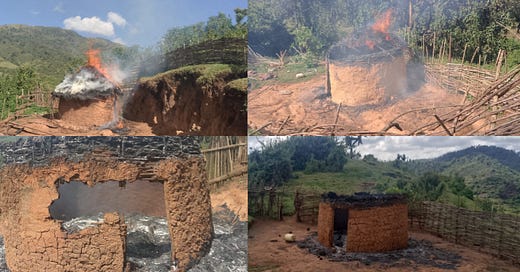Sengwer homes burned down again in Embobut forest, Kenya
Meanwhile, The Nature Conservancy’s Eldoret-Iten Water Fund project leaves Sengwer issues “unaddressed”.

Five homes belonging to Indigenous Sengwer people have been set on fire in the Embobut Forest in Kenya, despite a court order allowing the Sengwer to continue living there.
“Our fear is that this may be another wave of evictions, as we witnessed last year while there was a court order halting further evictions,” Elias Kimaiyo, a human rights activist and a community leader told the Kenyan newspaper, The Star.
Last year, Kenya Forest Service guards evicted more than 600 families from their homes in the Embobut forest. More than 400 houses were burned down. About 170 Kenya Forest Service guards evicted the Sengwer over a one-month-long operation called “Imarisha Msitu” Embobut, which translates as “Strengthen the Forest”.
David Ribong’ar is one of the Sengwer whose house was burned down four days ago. He told The Star that,
“I woke up and went to pick up some money I had borrowed from my neighbour to clear my child’s school fee balance; but when I returned, they had destroyed my house and burnt it. They have burnt my bedding, including six blankets and two mattresses, my solar panel, and other items.”
In March 2021, the Court of Appeal at Eldoret issued a ruling that states that,
. . . the status quo in Embobut forest as of today do remain in force, which means that those who are in occupation of forest land as of today, should not be evicted, but no new persons should be allowed to occupy forest land.
The Sengwer, then, “should not be evicted” from their traditional territory in the Embobut forest.
Kimaiyo told The Star that other groups, not the Sengwer, had invaded parts of the forest.
Kimaiyo said that,
“On our part, we have started initiatives to conserve the forest and have already put up a nursery to assist in our conservation efforts. We are currently working towards raising 10,000 seedlings.”
The Nature Conservancy’s Eldoret-Iten Water Fund
A project run by The Nature Conservancy, the Eldoret-Iten Water Fund, overlaps the Sengwer’s territory in the Embobut forest. When the Sengwer first heard about the project, they were sceptical.
In November 2024, Elias Kimaiyo told Mongabay that,
“As a community, we’ve endured a long history of land injustices, including forceful evictions perpetrated by the Kenyan government. Whenever donor funds come in, the government uses that as a tool to kick our people out of their ancestral lands.”
The Sengwer told The Nature Conservancy that they could not work with the Ministry of Environment, Climate Change and Forestry because of the repeated forceful evictions they had faced at the hands of the Kenya Forest Service.
Nevertheless, on 17 August 2023, the Sengwer signed the Free, Prior Informed Consent and Indigenous People’s Action Plan agreements for inclusion in the Eldoret-Iten Water Fund project. But the Sengwer only received five million Kenyan shillings (US$39,000) compared to the fifteen million shillings received by the Ogiek and Cherangani Indigenous communities for their projects.
The Nature Conservancy had only allowed for two Indigenous communities in its project — the Ogiek and the Cherangani. The Sengwer were included as part of the Cherangani.
Fredrick Kihara, Africa Water Funds director for The Nature Conservancy told Mongabay that the Sengwer contacted the project after the Ogiek and Cherangani communities had joined the project:
“A few months later, the Sengwer approached us, expressing that they did not want to be identified as Cherengani and requested to be included in the project as a separate entity. Although we had already allocated 30 million KES to the two other communities and were running low on funds, we honored their request. We managed to raise an additional 5 million KES. At that time, the Sengwer understood this and signed the FPIC and IPAP agreements.”

Kimaiyo told Mongabay that the Sengwer were sidelined because of their ongoing struggle for ancestral land:
“Many choose not to engage with us fully, labeling the Sengwer as troublesome simply because we advocate for our rights and seek answers. They resist the emergence of success stories from Indigenous communities.”
The Sengwer project includes growing tree seedlings. Kimaiyo says the project money “has not been effectively utilized for our benefit”.
“For instance, it took nearly a year to procure some tree nursery equipment, and the last consignment only arrived two months ago. We haven’t even been able to utilize any of those tools yet. The only support was that they provided funding for four months to pay the youth working in our indigenous tree nursery that we had established on our own, compensating them at a rate of 410 Kenyan shillings per day.”
The Sengwer are setting up two tree nurseries. One is for native tree seedlings and is already established. The other is for fruit tree seedlings and was not yet fully established in November 2024.
Kimaiyo told Monagabay that the Sengwer had not been paid for tree seedlings. In July 2024, the Sengwer communities supplied 45,000 tree seedlings to the Eldoret Water and Sanitation Company. The trees were valued at 800,000 shillings.
The Nature Conservancy acknowledged some delays in payments including to the Sengwer and told Mongabay that the issue would be resolved by the end of October 2024. However, the Sengwer had not received payment when Mongabay’s article was published on 12 November 2024.
In September 2024, the Sengwer did not take part in a project steering committee meeting. “There’s no point in attending these meetings if our issues remain unaddressed,” Kimaiyo told Mongabay.
Kimaiyo said that The Nature Conservancy was more focused on “nature commercialization” than conservation.






Thank you for this detailed report!
"...more focused on “nature commercialization” than conservation."
Yes, more monetizing of nature, powered by the new colonialism of outsiders claiming for their own purposes any of this land in Africa, supposedly free for the taking. Paraphrasing Trump: "They're eating the _land,_ of the people that live there."